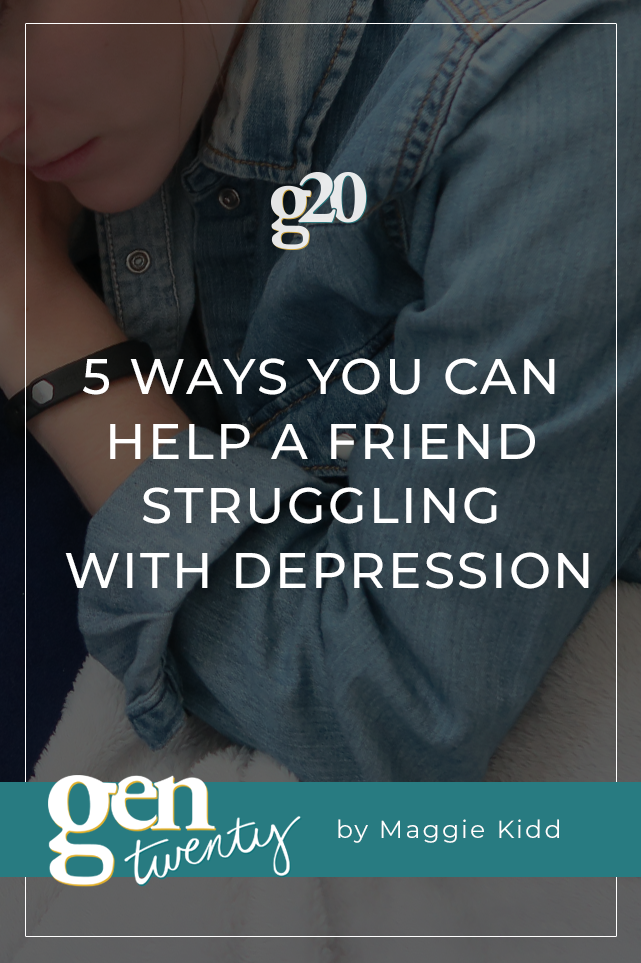With today’s media presence, depression is a word that seems to be making its way into more conversations; From the recent losses of designer Kate Spade and chef Anthony Bourdain to celebrities such as Demi Lovato who advocates for mental health awareness after opening up about her own personal struggles. It’s a positive step towards realizing that depression shouldn’t be something we refrain talking about because it’s uncomfortable. And, that it can affect anyone.
In fact, according to Mental Health America, “major depression is one of the most common mental illnesses, affecting 6.7% (more than 16 million) of American adults each year.”
Looking at these facts, it’s not surprising to hear that many of us know someone who may be struggling with depression. Unfortunately, depression doesn’t just affect the one person, but those around them as well. It can be tough to know how to navigate a relationship with someone who is struggling. You may know something is wrong and want to help, but maybe you aren’t sure what to do. Here are five ways you can help.
5 Ways You Can Help A Friend Struggling With Depression
1. Educate Yourself
One of the more important things you can do for a friend who is struggling is to educate yourself on what depression is. By learning about the disorder itself you’ll be able to recognize the signs and symptoms, and, you’ll be more comfortable in your role of a supporter.
Thankfully, it doesn’t take long to do a little research with so many organizations such as the National Institute of Mental Health at our fingertips. Agencies such as this one work to study disorders such as depression, but also provide great resources for those who want to learn more.
2. Listen
When it comes to any type of communication, listening is key. Someone who is depressed may be withdrawn and isolate themselves. They may feel embarrassed or as though their problems aren’t worth mentioning.
When you can, encourage them to talk to you about how they’re feeling and be willing to listen to what they have to say. You want them to know they are important.
Make sure you let them know you’re engaged and try not to respond with negative or dismissive responses. Not only will you learn more about what they’re going through, but it may help them feel more comfortable confiding in someone who wants to take the time to understand.
3. Ask Questions
The things you say to someone with depression, especially as a friend, can stick with them. It feels natural to want to respond with advice, but sometimes we don’t have the right advice to give.
When it is your turn to talk, one thing you can do is to ask questions. Try to ask open-ended questions such as, “how long have you felt this way?” or “what is something I can do to help you?”. This will encourage the conversation to go deeper into how they’re coping, what may be adding to their stress, and things you can do to help.
However, try not to be pushy. A few questions here and there are helpful, but you don’t want to leave them feeling overwhelmed.
[Tweet “5 Ways You Can Help A Friend Struggling With Depression”]
4. Encourage Support Options
Deciding to fight alongside someone when they’re living with depression is a tough choice, but an important one. It will be full of unknowns but don’t let that discourage you! You have to remember you can do what you can, but you alone can’t fix it for them. And that’s okay. This is where other support options are beneficial as well.
Things such as therapy, support groups, and medication are all avenues that can be explored to offer help. Getting treatment may be overwhelming for them and they may not feel be comfortable or that they have the energy to tackle it on their own. You can help by offering to research a therapist or even accompany them to a support group meeting.
5. Keep In Touch
Lastly, to stay in contact. Someone with depression may feel lonely or like a burden so they won’t initiate contact with family and friends. Don’t let their lack of contact make you lose sight of why you want to help. Even with our own busy lives, there are so many ways we can keep in touch with them during this time.
You could invite them for dinner, meet them for a walk, or have a movie night. If schedules or distance don’t permit a visit, try to keep in touch with calls or texts. They may not always respond right away, but it will remind them that you’re there and you care.
It’s great if you to want to help a friend but remember, your mental health is important too. Depression is difficult for all involved and it can be draining on your wellbeing. Know when you’ve reached your limit. In the end, your goal as a friend is to be a support system and do what you can, but they do also have to want to help themselves.
If you begin feeling emotional distress or feel that your friend may need immediate help, please contact the Substance Abuse and Mental Health Services Administration’s (SAMHSA) National Helpline at 1-800-662-HELP (4357).

